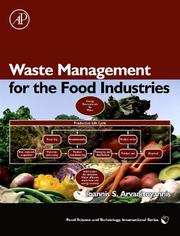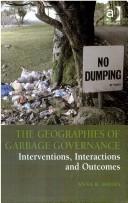| Listing 1 - 6 of 6 |
Sort by
|
Book
ISBN: 0309126983 9780309126984 0309126975 9780309126977 030917788X Year: 2008 Publisher: Washington, D.C. National Academies Press
Abstract | Keywords | Export | Availability | Bookmark
 Loading...
Loading...Choose an application
- Reference Manager
- EndNote
- RefWorks (Direct export to RefWorks)
Marine debris. --- Marine pollution. --- Marine environment pollution --- Marine water pollution --- Ocean pollution --- Offshore water pollution --- Sea pollution --- Seawater --- Coastal zone management --- Oceanography --- Pollution --- Water --- Marine resources conservation --- Beach debris --- Debris, Beach --- Debris, Marine --- Marine garbage --- Marine litter --- Marine refuse --- Marine trash --- Ocean trash --- Litter (Trash) --- Marine pollution
Book
ISBN: 9783930043309 3930043300 Year: 2008 Publisher: [S. l.] : Actar,
Abstract | Keywords | Export | Availability | Bookmark
 Loading...
Loading...Choose an application
- Reference Manager
- EndNote
- RefWorks (Direct export to RefWorks)
Trash art --- Refuse as art material --- Refuse and refuse disposal in art --- Factory and trade waste --- Art, Modern --- Déchets (Matériau d'artistes) --- Déchets --- Déchets industriels --- Art --- Exhibitions --- Expositions --- Elimination, dans l'art --- Rotor --- 691 --- 72.025 --- recyclage (bouwmateriaal) --- Bouwmaterialen (architectuur) --- Materialen (design) --- Herbruik (architectuur) --- Refuse and refuse disposal in art. --- Déchets (Matériau d'artistes) --- Déchets --- Déchets industriels

ISBN: 1281055476 9786611055479 0080554938 0123736544 9780123736543 9780080554938 Year: 2008 Publisher: [Oxford] : Academic Press,
Abstract | Keywords | Export | Availability | Bookmark
 Loading...
Loading...Choose an application
- Reference Manager
- EndNote
- RefWorks (Direct export to RefWorks)
Food industry and trade --- Refuse and refuse disposal. --- Waste disposal. --- Discarded materials --- Disposal of refuse --- Garbage --- Household waste --- Household wastes --- Refuse and refuse disposal --- Rubbish --- Solid waste management --- Trash --- Waste disposal --- Waste management --- Wastes, Household --- Sanitation --- Factory and trade waste --- Pollution --- Pollution control industry --- Salvage (Waste, etc.) --- Street cleaning --- Waste products --- Food --- Food preparation industry --- Food processing --- Food processing industry --- Food technology --- Food trade --- Agricultural processing industries --- Processed foods --- Environmental aspects --- Processing --- Engineering --- Food Science and Technology

ISBN: 1317030583 1315557754 1317030575 1281189685 9786611189686 0754688089 9780754688082 0754644332 9780754644330 9781315557755 9781317030560 9781317030577 9781138276567 1409487555 Year: 2008 Publisher: Aldershot, Hampshire, England Burlington, VT Ashgate
Abstract | Keywords | Export | Availability | Bookmark
 Loading...
Loading...Choose an application
- Reference Manager
- EndNote
- RefWorks (Direct export to RefWorks)
This book examines the neglected geographies of waste management, in particular, the increasingly complex patterns of multi-level governance and the integral processes of trans-localization and politicization that are emerging in waste networks. Furthermore, it provides recommendations for better management of the waste sector in the future.
Refuse and refuse disposal --- Recycling (Waste, etc.) --- Conversion of waste products --- Recovery of natural resources --- Recovery of waste materials --- Resource recovery --- Waste recycling --- Waste reuse --- Conservation of natural resources --- Energy conservation --- Salvage (Waste, etc.) --- Waste products --- Discarded materials --- Disposal of refuse --- Garbage --- Household waste --- Household wastes --- Rubbish --- Solid waste management --- Trash --- Waste disposal --- Waste management --- Wastes, Household --- Sanitation --- Factory and trade waste --- Pollution --- Pollution control industry --- Street cleaning --- Government policy. --- Environmental aspects --- Déchets --- Recyclage (Déchets, etc.) --- Elimination --- Politique gouvernementale

ISBN: 9780822959830 0822959836 1306708982 0822973375 9780822973379 Year: 2008 Publisher: Pittsburgh, Pennsylvania
Abstract | Keywords | Export | Availability | Bookmark
 Loading...
Loading...Choose an application
- Reference Manager
- EndNote
- RefWorks (Direct export to RefWorks)
History of North America --- Environmental protection. Environmental technology --- United States --- Municipal water supply --- Sanitary engineering --- Refuse and refuse disposal --- Municipal services --- Eau --- Technique sanitaire --- Déchets --- Services municipaux --- History --- Approvisionnement urbain --- Histoire --- Elimination --- Civil & Environmental Engineering --- Engineering & Applied Sciences --- Environmental Engineering --- History. --- Déchets --- Cities and towns --- Urban water --- Water, Municipal --- Water, Urban --- Municipal engineering --- Water-supply --- Engineering, Sanitary --- Environmental health engineering --- Engineering --- Public health --- Buildings --- Sanitation --- Discarded materials --- Disposal of refuse --- Garbage --- Household waste --- Household wastes --- Rubbish --- Solid waste management --- Trash --- Waste disposal --- Waste management --- Wastes, Household --- Factory and trade waste --- Pollution --- Pollution control industry --- Salvage (Waste, etc.) --- Street cleaning --- Waste products --- Environmental engineering --- Environmental aspects --- United States of America
Book
ISBN: 1281675156 9786611675158 140208711X 1402087101 9048179637 Year: 2008 Publisher: [New York] : Springer,
Abstract | Keywords | Export | Availability | Bookmark
 Loading...
Loading...Choose an application
- Reference Manager
- EndNote
- RefWorks (Direct export to RefWorks)
Since 1960, the importance of the waste sector has increased substantially in many EU countries from an economic and environmental viewpoint, yet not much literature is readily available on the topic. Key questions answered in this book are whether the use of market oriented methods and organization forms can diminish the increasing costs and stimulate waste reduction and sorting. The Waste Market undertakes the interesting task of examining the creative ways in which a handful of European countries, namely Belgium, the Netherlands, Norway, Spain, and Sweden, have managed their waste collection market. For instance, the Netherlands experimented a lot with competition and different types of ownership. It shows that competition is more important than ownership. The use of public firms, exceptional in other European countries, seems to be a powerful instrument to enhance competition. The lack of these firms might explain why private production is not always cheaper than own collection by municipalities in Sweden. Instead of public firms, cooperation is much more used in Spain and Norway to exploit economies of scale. This insightful work also discusses variable charging that motivates customers to reduce waste. Different forms of variable charging are becoming more widespread in Belgium and the Netherlands and are very effective in reducing the amount of waste and help motivate customers to recycle their waste better. In the Netherlands different systems based on weight, bag, volume or frequency are used, which differ in effectiveness and implementation costs. The Flemish experience shows that variable charging can be even more effective, if it is combined with other policy instruments.
Refuse and refuse disposal --- Management. --- Government policy --- Contracting out --- Costs. --- Management --- Costs --- Discarded materials --- Disposal of refuse --- Garbage --- Household waste --- Household wastes --- Rubbish --- Solid waste management --- Trash --- Waste disposal --- Waste management --- Wastes, Household --- Sanitation --- Factory and trade waste --- Pollution --- Pollution control industry --- Salvage (Waste, etc.) --- Street cleaning --- Waste products --- Industrial organization. --- Waste disposal. --- Environmental economics. --- Environmental sciences. --- Environmental management. --- Econometrics. --- Industrial Organization. --- Waste Management/Waste Technology. --- Environmental Economics. --- Environment, general. --- Environmental Management. --- Economics, Mathematical --- Statistics --- Environmental stewardship --- Stewardship, Environmental --- Environmental sciences --- Environmental science --- Science --- Economics --- Environmental quality --- Industries --- Organization --- Industrial concentration --- Industrial management --- Industrial sociology --- Environmental aspects --- Economic aspects --- Waste management. --- Environment. --- Balance of nature --- Biology --- Bionomics --- Ecological processes --- Ecological science --- Ecological sciences --- Environment --- Environmental biology --- Oecology --- Population biology --- Ecology
| Listing 1 - 6 of 6 |
Sort by
|

 Search
Search Feedback
Feedback About UniCat
About UniCat  Help
Help News
News